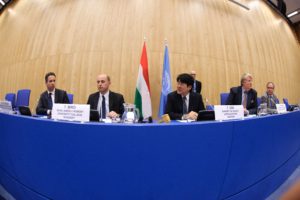On the recommendation of the Dean of the Faculty of Water Sciences of the Ludovika University of Public Service, the Senate of the University conferred an honorary doctorate on Csaba Kőrösi, who has held the 77th UN Presidency of the General Assembly since September last year. After the award ceremony, we also spoke to the new honorary doctor about the increasing role of science in geopolitical crises and the commitment of young people.
He has a reputation as a regular runner: I guess you started your day with a run in nature today. What does your favourite spot, the Árpád Lookout, look like?
I did run this morning, but unfortunately I can’t report on the lookout, as this time my location was Remete Hill
I hope you have managed to prepare for today’s festivities with this round. In your honorary doctorate laudation, you said that the university would very much like to have you as a lecturer, once you have completed your current work. Have you thought about this possibility?
Let me split this in two. One thing is for sure: I am very happy to help the university whenever and however I can. However, I cannot say at this stage what kind of work I will be doing after the end of my term as President, or whether I will be teaching at the university. You can admit, I haven’t had the time or the energy to deal with this yet.
It’s perfectly understandable. But I know that you’re thinking about how to get young people more committed to the issues of climate change, and particularly the water crisis.
I think they are much more concerned about the future, including climate change and the water crisis, than, for example, you or my generation think they are. I don’t have to go far; I know this for a fact from my own daughter.
Her role is quite special, as I understand she was involved in sneaking in the term ‘climate crisis’, which was left out of the climate negotiations because of various interests, back into the documents.
You know it well, although it wasn’t quite like that, because more than one word was left out. What actually happened was that we were in the middle of a very difficult series of negotiations when the SDGs, the Sustainable Development Goals, had to be formulated. There was a very strong divergence in the representation of national interests, resulting in three consecutive rejections by a group of countries of the idea of a dedicated sustainable development goal on climate. It really upset me. When I went home one evening and my daughter Lili asked me what we had achieved that day, I told her in utter exasperation that although we will have the SDGs, they’ll be without climate targets, as it seems currently. My daughter, who was about 16 at the time, was shocked and said: “Dad, you’re crazy – go back to these people and tell them if they don’t understand what this is all about, then they mustn’t play with our future, because they have no right to do that. Tell them to go home, because we’re not going to listen to what they suggest. Or indeed take this matter seriously”. I went back to the meeting room the next morning, and although this message could not be conveyed in a one-to-one diplomatic negotiation, the essence of it could. At first there was a stunned silence in the room, then applause broke out. By that afternoon, we had the 13 SDGs, now called climate targets, and which became the core of the Paris climate agreement. But to return to the original question, we can actually be optimistic about young people, because they know what they want, better than we think. I work a lot with young people; I also hold a lot of forums where we think together with young people. Let’s not underestimate their ability to see and understand a much broader field than we assume they do. Nor should we underestimate the anxiety they have about what will happen to the world by the time they get to a decision-making position. It’s on the table in their lives, in their environment, much more powerfully than many people believe at the moment.
Finally, I am curious to know the details of your presidential motto: of the words “solidarity, sustainability, science:” the first two are perhaps more understandable, but I am very interested in how you link them to science.
There are two big reasons behind my choice. One is that we are in the middle of a very, very complex crisis, where our different problems are interacting to create a rather difficult situation. It’s therefore clear that we want to find integrated solutions. However, such multi-layered solutions, with a pre-calculated set of options, can only be based on scientific evidence, and only science can produce these options. The other reason for my choice is that the world is currently facing a worsening geopolitical crisis. This crisis is eroding trust between member countries, eroding the willingness to cooperate and narrowing the space in which member countries can work, think and decide together. In addition, the crisis eliminates existing cooperation arrangements, such as non-proliferation agreements, and this paints a rather gloomy vision for the future. But if we want to broaden the common ground, the area where we are able work together, the common ground is not to be looked for in geopolitical affairs, not even in classical political affairs, but somewhere in the future governance of the global public goods we share. Because there’s no structure for how we use these global systems to achieve better results than we have now. Currently, this question is completely open. Although climate change may be out of the spotlight in times of geopolitical conflict, it still exists: the water crisis is also present, as is the concern for biodiversity loss. We need to find common answers to these questions, even if our times are not conducive to common global reflection. But if we look for political agreement on this, we’ll reach a dead end. It will be much easier to find common ground if we aspire to answer these questions on a scientific basis. As President, in cooperation with the Secretary-General and my colleagues, I would like at least to establish a starting point in the UN so that there is something to move forward from together, so that there is a better chance of agreement.


